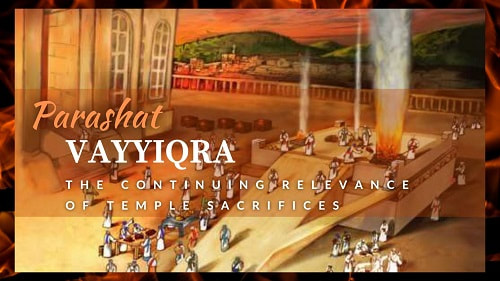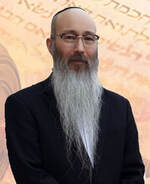|
By: HaRav Menashe Sasson מאת: הרב מנשה ששון This week's Parashat piece is dedicated to the Jews who have been murdered, abducted, or otherwise harmed in the current war against our Arab enemies. Parashat Vayyiqra, the first Parashat of Sefer Vayyiqra, introduces us to korbanot (sacrifices) [קורבנות], starting first with general rules of korbanot [קורבנות] and then moving on to discuss particular korbanot [קורבנות], to include elevation offerings from sheep and goats, elevation offerings from fowl, flour offerings, oven-baked offerings, pan-baked offerings, deep-pan offerings, the salting of offerings, peace offerings, sin offerings, bull offerings, He-goat offerings, and guilt offerings. After the destruction of the Beit HaMikdash (Temple) [בית המקדש] in Yerushalayim, the Men of the Great Assembly instituted thrice-daily prayers as a substitute for the daily offerings in the Beit HaMidash [בית המקדש]. The dispute between the Rabbis and Rabbi Yehuda with regard to the times beyond which the different prayers may not be recited is rooted in a profound disagreement, also manifest in a later amoraic dispute. It was stated: Rabbi Yosei, son of Rabbi Ḥanina, said: The practice of praying three times daily is ancient, albeit not in its present form; prayers were instituted by the Patriarchs. However, Rabbi Yehoshua ben Levi said that the prayers were instituted based on the daily offerings sacrificed in the Holy Temple, and the prayers parallel the offerings, in terms of both time and characteristics. T.B., Masekhet Berakhot, 26b. The Talmud states that the recitation of both Shema (שמע) and Grace After Meals (ברכת המזון) are required by the Torah, but that prayer is required “only” by Rabbinic law. T.B. Masekhet Berakhot, 21a. Ramban (Moses ben Nahman, aka: Nachmanides), relying on the pasuk: And when you go to war in your land against the adversary that oppresses you, then you shall sound an alarm with the trumpets; and you shall be remembered before the Lord your God, and you shall be saved from your enemies. . . , , Bamidbar 10:9, rules that a Biblical obligation exists to pray during times of crisis, but that there exists no such general (e.g. daily) obligation to pray: It is a mitzvah to plead fervently with G-d through prayer and teru’ah [Shofar blasts] whenever the community is faced with great distress . . . for it is a mitzvah to affirm in moments of distress our belief that the Holy One listens to prayers and intervenes to grant aid. Commentary to Sefer HaMitzvot, positive commandment 5. Although Nachmanides and Maimonides agree there is a Biblical obligation to pray during times of crisis, Nachmanides, unlike Maimonides, rules that no Biblical obligation exists to pray on a daily basis. Thus, we see from the foregoing that the obligation to bring korbanot [קורבנות] in the Beit HaMidash [בית המקדש] is a Torah obligation and that daily prayer, although based in part on the practices of the Patriarchs, constitutes an obligation which is based on Rabbinic decree. Furthermore, building and maintaining the Beit HaMidash [בית המקדש] is a timeless obligation. In Parashat Teruma, the Jewish people were commanded to build a Mikdash in the desert. Later, in Sefer Debarim, the Jewish people were commanded to build a Mikdash “in the land which the Lord God of thy fathers gives thee to possess it, all the days that you live upon the earth. . . .” Debarim 12:1-7. In other words, as the Ohr HaHayim (Hayyim ben Moshe ibn Attar, 1696-1743) held, it is a positive commandment for the Jewish people to build and maintain a Beit HaMikdash [בית המקדש] whenever the Jewish people reside in Eretz Yisra’el. That is, when the Jewish people are in possession of the Eretz Yisra’el, they are subject to a positive Biblical commandment to build and maintain a Mikdash “all the days that [the Jewish people] live on the Land.” Debarim 12:1. The Rambam (Moses ben Maimon, a.k.a Maimonides, 1138-1204) held that, upon entering Eretz Yisra’el, the Jewish people became obligated to appoint a king, “erase the memory of Amalek,” and build a Beit HaMikdash. Rambam, Hilchot Melachim 1:1. The Rambam also held that the appointment of a king should precede the war against Amalek, and that the seed of Amalek should be annihilated prior to the construction of the Beit HaMikdash [בית המקדש]. Id., 1:2. An obvious difficulty with building a Beit Mikdash [בית המקדש] only after a king has been appointed over Yisra’el and after the king has “annihilated” the seed of Amalek, is the fact King Solomon built the first Beit HaMikdash [בית המקדש], notwithstanding that the seed of Amalek has never been “annihilated.” The Talmud, on the other hand, states that “[e]very generation which did not witness the rebuilding of the Beit HaMikdash [בית המקדש], is considered as if it was destroyed in that generation.” T.B. Yerushalayim, Maseket Yoma 1:1. The Sfat Emet (Yehudah Aryeh Leib Alter, 1847-1905) explained that the Talmud should not be taken literally, but rather, should be understood to mean that each generation must do its part to facilitate the rebuilding of the Beit HaMikdash [בית המקדש]. Today, the Jewish people, after having been dispossessed of sovereignty over Eretz Yisra’el for some 2000 years, once again possess political sovereignty over Yerushalayim and Medinat Israel (the modern day State of Israel). What, as a practical matter, can we, the Jewish people, do in this generation to facilitate the rebuilding of the Beit HaMikdash [בית המקדש]? In order to construct any building, one must first prepare the construction site by removing anything and everything that is unnecessary or detrimental to the construction of the intended new building. Thus, the first step in rebuilding the Beit HaMikdash [בית המקדש] must be to remove all the mosques that currently occupy the Temple Mount and its surrounding areas. Preparing the Temple Mount for the Third Beit HaMikdash [בית המקדש השלישי] won’t be easy, but it is necessary. As most of us know from experience, the longer one delays in doing something that must be done, the harder it usually is to complete the task. Our purpose in this World is to work, so let us — without further delay — get down to the business of working to build the Third Beit HaMikdash [בית המקדש השלישי], before that task becomes even more difficult that it already is. שבת שלום Shabbat Shalom! Copyright © The Israel Foundation. All Rights Reserved.
0 Comments
Your comment will be posted after it is approved.
Leave a Reply. |
THE ISRAEL FOUNDATION


